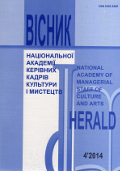THE ORIGINS OF RIVNE THEATRICAL TRADITIONS: the end of the XVIII – the beginning of the XX century
DOI:
https://doi.org/10.32461/2226-3209.4.2014.138310Keywords:
theatre, performance, theatrical art, cultural life, theatrical troupeAbstract
Rivne theater past has a peculiar historical destiny. It was a difficult and thorny way of the artists. The Complete social conditions, national oppression retarded the development of the theater business, which had to become a professional one, as it happened in many other European cities. For centuries the people from Western Ukraine contributed to the Ukrainian theatrical culture. Gradually, the theatrical traditions appeared from different rites, games, entertainments.
All these forms of popular culture open the great opportunities for developing folk stage creativity. The Volyn original rites were not created in isolation from the rites of other nations with whom the Ukrainians are linked by common long-term cultural ties. The goal of the article is to analyze the beginning of the formation and establishment of Rivne region theatrical traditions, to determine their influence on Ukrainian culture, the development of the native language and volynyan national consciousness.
In 1778, Prince Józef Lubomirski (1751 – 1836), who owned at that time Rivne, allowed the citizens to arrange folk entertainment in his park. There was the theater. The first permanent theater in the Rivne region was established in 1783 in the Lyubomirki palace in Dubno. At first the troupe had a small building, It was headed by Polish theatrical figure from Warsaw Wojcech Boguslavskiy (1757 – 1829).
There were difficult conditions at the beginning of the XIX century after the third partition of Poland and Volyn transition to Russia. Those events reflected on the development of the cultural life of the region center Rivne, Volyn province.
But Rivne land remembered and honored the tradition of organizing amazing theatrical performances. The second city was Ostrog, had been known as the cultural center of Ukraine. There were the academy and the printing press, school theater. At the beginning "school drama" and school declamation appeared there. Recitation according to the modern poetics of the school theater were divided into two categories such as class and holidays. They recite a poetry without any stage decorations, but in some cases, the moderate stage design allowed. It was found out that there was also a theater at Jesuit College in 1726 – 1742.
The first decade of the XX century was marked by economic rise and cultural uplift of Rivne. Men's Gymnasium and Real school could have theater groups and stage performances, the participation in them was an honor. There were also amateur groups of other nationalities such as Polish, Jewish, Russian, Czech. The Creative life in Rivne intensified with the opening of the new theater building. You could see and listen to the drama, comedy, opera, and even concerts of the well-known creative teams on the stage. The wandering corpses on tour started to visit Rivne. The First World War did great harm to the further development of the theater business. The touring theaters disappeared, the local amateur drama groups almost stopped working. During the revolution and civil war theater life in the city stopped. In 1920 Western Ukraine joined Poland, Rivne became a district center. In the city cultural life was largely "imported". After the civil war there were many artists in exile who made their living concerts, the vast majority of them were mediocre quality. Volyn Ukrainian theater was rather respectful among the touring troupes. It was headed by the direction of Pevnog (? – 1940) from Lutsk. This theatre had a traditional Ukrainian ethnographic, historical, social and domestic repertoire, which was popular in Volyn.
Analyzing the theatrical traditions of that period, we can make some conclusions. The art institutions lacked professionalism, artistic integrity, excellence in directing and acting. Everything rested on amateur enthusiasm with a strong desire not to lose the national art treasures that had been destroyed for the recent time. fate of artists in the formation of the Ukrainian theater in Rivne region was not easy, yet it existed, did, flashed, and then fading again born for giving people hope, enthusiasm, patience and faith in the future of theater arts. The theatrical Arts of Rivne region, in that period, was the link that connected people in the hours of happy contemplation of action, whose name was the art. Due to theater-goers people saw not only their miserable everyday life, but also to take off happiness and destruction of hope, strong love and fierce hatred. Many of those days the cultural workers of Rivne’s theater managed to survive in those days, only because they saw on the stage of life with all the joys and troubles, believed that everything would pass and after the chaos and failure, the peace of mind would come.Downloads
Published
Issue
Section
License
Authors who publish with this journal agree to the following terms:
1. Authors retain copyright and grant the journal right of first publication with the work simultaneously licensed under a Creative Commons Attribution License International CC-BY that allows others to share the work with an acknowledgement of the work's authorship and initial publication in this journal.
2. Authors are able to enter into separate, additional contractual arrangements for the non-exclusive distribution of the journal's published version of the work (e.g., post it to an institutional repository or publish it in a book), with an acknowledgement of its initial publication in this journal.
3. Authors are permitted and encouraged to post their work online (e.g., in institutional repositories or on their website) prior to and during the submission process, as it can lead to productive exchanges, as well as earlier and greater citation of published work (See The Effect of Open Access).


